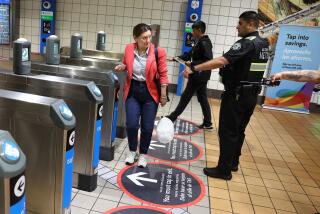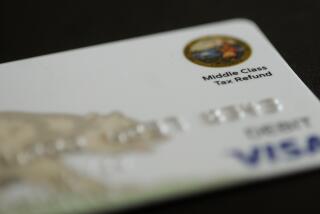U.S. Mint blocks frequent fliers’ scheme to collect easy miles
- Share via
The idea behind credit cards that offer airline rewards is simple enough: The more you spend on the card, the more free airline miles you get.
But the U.S. Mint recently broke up a scheme by cardholders who figured out a way to get money for nothing and rewards for free.
Under the scheme, people used their credit cards to purchase dollar coins from the U.S. Mint. They then deposited the coins in the bank to pay off the credit card balance. In the end, the cardholders were out no money but their credit cards registered thousands of dollars’ worth of spending, and thus they earned thousands of rewards points or miles from the airlines.
“It’s not the right thing to do,” said Tom Jurkowsky, a spokesman for the U.S. Mint. “It’s not what the program was meant to do.”
Since November, the U.S. Mint has written letters to about 75 cardholders who may have tried the scheme to collect airline rewards points.
The trouble began in June 2008 when the U.S. Mint launched a “direct ship” program to sell dollar coins directly to the general public in hopes of increasing the use of the coins, which last longer than paper currency. Under the program, individuals could buy a maximum of 500 of each of five presidential dollar coins issued by the mint (Washington, John Adams, Jefferson, Madison and Jackson). But the mint set no limit on purchases of a sixth coin, which bears an image of Sacagawea, the Shoshone woman who guided the Lewis and Clark expedition. The mint allowed people to buy the coins with credit cards and offered free shipping in the continental U.S.
Several savvy frequent fliers got the idea to buy the coins with credit cards to accumulate reward points and then pay off the credit card balance after depositing the coins at a bank. (Some banks charge to count coins; others offer the service free.)
Word spread about the scheme on Internet blogs, such as Flyertalk.com. The Wall Street Journal, which broke the story last week, quoted a frequent flier who identified himself as Mr. Pickles and claimed he bought $800,000 in coins with his credit cards to jack up his rewards point total. He told the Journal that he pulled off the scheme by using several banks and numerous credit cards.
Other frequent fliers picked up the idea online and immediately ordered the coins in bulk.
“I just placed my order,” said a Flyertalk member dubbed “matagal.” “A painless way to get miles. Thanks.”
A member with the moniker “chasethemiles” called the coin-for-miles deal “one of those fantastic deals that only come once in a great while.”
Although no laws were broken, officials at the U.S. Mint said the deal conflicted with the intent of the program, which was to circulate the coins throughout the economy. Under the scheme, the coins were deposited directly into banks. Jurkowsky said the mint already has a program to distribute the dollar coins in bulk to banks.
Since the program began, the mint recorded about 40,000 “direct ship” coin orders. Jurkowsky said the mint believes fewer than 1% of those orders may have been made to generate airline miles.
In the letter sent to the biggest coin buyers, the mint asked the cardholders to explain their unusually large purchases.
Jurkowsky said some of the people who responded to the letters had legitimate explanations, such as owners of coin-operated laundromats who need the coins to operate the washers and dryers.
But so far about 20 people who couldn’t explain the need for so many coins have been barred from ordering more coins, he said.
The mint is now making a permanent fix to the problem, Jurkowsky said. In the future, credit card purchases will be recorded as cash advances rather than credit card purchases. Credit cards typically do not give reward points for cash advances.
Industry insiders say the real losers in such schemes are not the airlines but the banks that buy the rewards points from the airlines and offer the rewards to cardholders to encourage them to spend on their cards.
A spokeswoman for Bank of America said the bank was aware of the matter and was looking into it. Representatives for Chase and Citibank declined to comment.
Rick Seaney, founder of Farecompare.com, a website that monitors airline fares and fees, said frequent fliers are always trying to find shortcuts to boost their airline reward points to win free flights and get seating upgrades or other perks, such as access to VIP lounges.
“This is not the first one I’ve seen,” he said of the coin-for-rewards deal. “It’s sort of a hobby for many people.”
‘Basic’ rights for stranded fliers
The U.S. Department of Transportation seems to be on track to adopt new rules to protect stranded airline passengers.
For years, passenger rights groups have pressed the federal government to adopt guidelines to ensure that passengers who are stuck on a delayed flight are given access to food, water and bathrooms and allowed to get off the plane if the delay lasts more than three hours.
The airlines have resisted such guidelines, saying the decision to let passengers off of a delayed plane is safety matter that should be decided by pilots, air traffic controllers and other airline personnel at the airport.
But last month the Transportation Department slapped Continental, ExpressJet and Mesaba airlines with $175,000 in fines for stranding dozens of passengers for nearly six hours on an airport tarmac in Rochester, Minn.
And in a recent blog post, Transportation Secretary Ray LaHood expressed outrage over the Rochester incident, saying, “Look, this is just no way to treat passengers, customers, or anyone. You can’t strand people overnight without access to the basics. It’s not right; it’s against the rules.”
His closing line may spell bad news for the airlines: “And I know we will use what we have learned from this investigation to strengthen protections for airline passengers subjected to long tarmac delays down the line.”
More to Read
Sign up for The Wild
We’ll help you find the best places to hike, bike and run, as well as the perfect silent spots for meditation and yoga.
You may occasionally receive promotional content from the Los Angeles Times.






